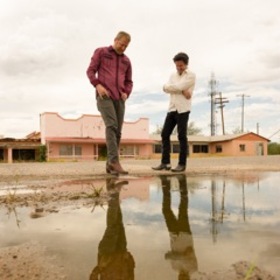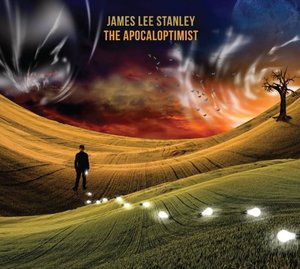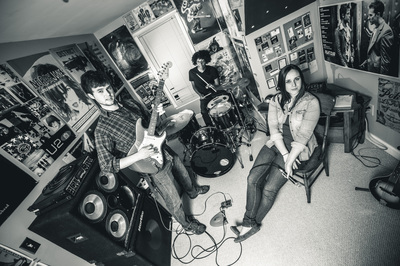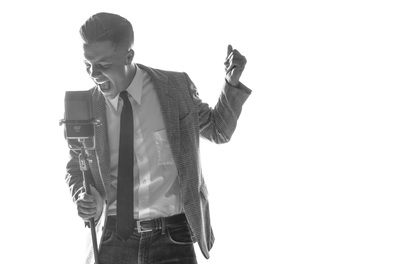CRACKER'S "WAITED MY WHOLE LIFE"
According to Cracker's David Lowery...
"We recorded an earlier version of this song in Athens, Georgia, with Ben Mize former drummer for Counting Crows. We didn't use the track but Ben really took a liking to the song. He went down to the old skating rink on the east end of town because it's usually filled with interesting characters like 'The Cowboy Skater.' He concocted a small town mid life love story between 'The Cowboy Skater' and a local woman. It's fun and off the cuff, the way the song was intended."
******************************
A Conversation with James Lee Stanley
Mike Ragogna: James, you called your new album The Apocaloptimist. Why are you so optimistic about the Apocalypse? Why, James, why?
James Lee Stanley: Mike, thank you for the time. By way of clarification, you seem to have misconstrued my intention with the word "Apocaloptimist."
MR: Oh, no...hate when that happens!
JLS: As it happens, I am not optimistic about an apocalypse. I seriously reject the nouveau nihilism, and the entertainment industry's infatuation with some dystopian future. However, I am optimistic that we can overcome what is one possible future for us as a nation, a people and a world.
You know if you come from a loving family you tend to project that same ethos. I was born into a three-story tenement row house in South Philadelphia, the first son of the fourth generation living there. My great grandparents, my grandparents, my parents and my aunts and uncles on my mother's side were all Italian. Consequently, for the first three years of my life there was no time when someone wasn't kissing me. That tends to color how you see the world and your place in it.
MR: You bang out your album with "Living The Party Life." Is this way of life the result of a recent party or perhaps an apocalyptic celebration of sorts? Is all this partying where you got that "Twinkle In Your Eye"? How quickly did the crowd disperse when you shouted, "Last Call"? See where I'm going here?
JLS: Yes I see! You are referencing the songs out of sequence and thereby obscuring the evolution of the song cycle.
MR: No, no, I would never do such a thing!
JLS: It's okay, as I seem to be the only person for whom the sequence is important. We live in a world of "iPod Shuffle," so I get it.
In explanation, "Living the Party Life" really is a joyous condemnation of the new nihilism I previously referenced. We live in a world where wanting the air clean to breathe, or the water clean to drink, etc is being condemned as some sort of liberal plot. In this last election, we had less than 40% of the eligible voters involved. And that means that 1 in 5 voters chose the cretins who will control the house for the next two years. Folks busy watching the Kardashians and standing in line for Black Friday but couldn't make it to the polls. Sadly, we get the government we deserve.
In an effort to obscure my somewhat pedantic inclinations, I did try to make the track so engaging that the message wouldn't be a hammer, but more a whisper in your ear. Love the atmosphere on that track. Working as bar tender and as a saloon singer, I always heard them ring the bell and announce "last call." I always thought someone should write a song with that title, turns out it was me.
"Twinkle In Your Eye" is my take on Alzheimer's and on love and loyalty. It's like a three-minute version of "The Notebook."
MR: Your next song is titled "Gypsies In The Hallway." How did you first react to there being gypsies in the hallway?
JLS: I guess when the first lobbyists were sent to jail a while back. As you know, "gypsies" is my euphemism for lobbyists. I changed the word from "lobbyist" to "gypsies" for the simple reason that "lobbyists" sucks when you sing it--not to mention that lobbyists suck in real life as well--so I had to find a word that would "smooth the ear" as the Chinese say.
In Europe, lobbying is illegal and they call it by its real name--bribery. We have a collection of corporate stooges in Washington right now, and yes, I made up that word as well. It seems to be more in line with what they are doing to our country and our world. I certainly am casting no aspersions on any of the Romani tribe.
MR: I so agree with you, James, what a mess. So you end the album with "Lullaby (For Chloe)." That's all, I'm just sayin'.
JLS: Yes, I like the idea of some comforting gentle message at the end of the CD. Some hopeful encouragement that we are safe and things will be all right. Wrote it for my pal John's first grandchild, who was so ecstatic over this new arrival. I was sitting in the living room of his vacant home in Illinois. The whole family was gone and I was alone. There was a fire in the hearth and I was looking out the window at the snow floating on the pines. It felt just like God was in his heaven and all was right with the world. A rare feeling for me.
MR: What were the songwriting and recording processes like this time around and how did they differ from your last album, The Apocalpessimist, which is my personal favorite.
JLS: You're a funny guy Mike! Actually, my last recording was an acoustic celebration of Rolling Stones songs, entitled All Wood and Stones II. It was a collaboration with my friend and great musician, John Batdorf. Got some fantastic reviews and both it and All Wood and Stones I still get airplay on a daily basis.
As to your question, when I finished my last solo CD, Backstage At The Resurrection, I thought I had made one of the best recordings anyone had ever made, but I seem to be amongst the discerning few with that opinion. As I had 25 CDs out by that time, I thought that I probably wasn't going to write any more, and that I would tour behind all those CDs.
But something I cannot explain happened. I felt this incredible burst of creative energy and I essentially wrote all those songs over about two months. Don't know where it came from, but I wish I did. I'd go back there more often. Mostly, my writing is a process of countless rewrites over a long period of time. I am truly confounded by the actual process, as once the song is finished I have no clear recollection of how much work went into creating it. If I didn't keep the notebooks, I wouldn't be able to convince myself it happened by my efforts. But then I love to cook and frequently make up recipes that are wonderful that I cannot remember later. Hmmm...
It seems like we are just receptors for these things. Perhaps the songs, the art if you will, is out there and if you are receptive and prepared you can snag a little of it. That being said, it still took me about two years to realize this project, The Apocaloptimist. The songs were essentially written of a cloth and then refined and recorded and re-recorded.
I recorded "Gypsies" in D minor, in A minor, in B minor and finally settled on the version in E minor though I did keep the solo in B minor as I liked the way it lay on the neck of the guitar. "Apocaloptimist." A hard word to say at first, but worth the effort. Maybe that's a reference to my work in general...
MR: Over the course of your career, you've recorded thousands of albums, perhaps even hundreds. How did all this singer-songwriterdom mold you into the current Apocaloptimist?
JLS: Funny again Mike, only 27 albums, so I've got quite a way to go to catch up to your hyperbole. Growing up with some great music, and great musicians in my family, I was always enchanted with making music.
I also like to read and seem to devour books and now that I've gotten that download library thing for my iPad it's even more like an obsession. Consequently, it didn't take me long to become bored with most pop lyrics. The generic love song bores me and these days the lyrics of Beyonce and her ilk are unlistenable to me, so I naturally gravitate to the singer/songwriter area of music. Dylan knocked my socks off.
That being said, I still had no problem with every phase of the Beatles songwriting career. I still sing their stuff in my shows when I feel the muse. Great joyous stuff and always infused with a sly chord, or reference to keep us on our toes.
I also love poetry, the art of language and the poet singer/songwriters resonate for me in a way that most pop music does not. I need to hear intelligence. I need to hear heart. I need to hear authority and craft. Hopefully all of that at least informs what I do for the "discerning few."
MR: In "Here We Have My Father," you're trying to say...no, better let you describe it.
JLS: Just trying to tap into that nascent experience of looking up to a parent and connecting it to the end of the ride when you are the parent and they are in need of the guidance, patience and love. My father was a bright, vital man and to watch him slow down and finally stop was a profound, sad and enlightening experience for me and I suspect anyone.
The song begins with the line, "...here we have my father, moving kind of slow." The subtext there is that he is now an old man. I followed the description of my father with one of my sisters and then my mother, finally coming to rest on us all in the last verse. I must tell you that when I do this song in concert, it seems to powerfully affect everyone. I love the melody and the guitar orchestration on it. For me, it definitely demonstrates those necessary traits I mentioned earlier...intelligence, heart, authority and craft. And it's so musical. Yes, I like that one.
MR: Speaking of fathers, are you one?
JLS: Actually, I am not a father. I noticed early on, that my friends who were musicians and parents tended to be gone most of the time, missing everything that is vital and so important to the experience of being a parent. They were phone daddies. I decided I wasn't going to do that. I thought that once I stopped doing what I do, then I would have children, when I could be home and there for them. Right now, we have a cat and some fish. It's perfect balance, because if I am gone too long, the cat can eat the fish.
MR: James. Billion dollar question. Don't hold me to that. What advice do you have for new artists?
JLS: You know, when I started doing this, there were few wealthy musicians, Frank Sinatra, Elvis Presley... But most were working their craft, their art and some were making a living but they all were doing it for the love of doing it. I suggest that if you want to spend your life making music, you aim for doing that, for becoming as much of a master of your art and your craft as you can. Claim that as your reward, as very few of us actually catch that brass ring. Do it because you love it. If being solvent is more important to you, then perhaps you should do something else for the money and do the music for the love of it.
Charles Ives was an amazing composer, but his father taught him early on, do something else for the money, that way you won't give over your muse to the popular crowd. If you don't need the crowd to approve of what you do to the extent that you derive your living from them, then you can do what you want. That being said, I definitely do depend on the approval of the crowd enough to convince them to support my work, and yes, I still do exactly what I want. Maybe that explains my relative obscurity.
MR: What's next on the James Lee Stanley agenda?
JLS: I am about to play as many places as I can over the next year to bring attention to this CD, The Apocaloptimist and I am already up to my earring in Straight From the Heart, a musical that I have been working on for the last eighteen years. I finally have a recorded version of it that we are putting out in the spring. I am on it as an artist but it actually stars my, beautiful and extremely talented sister, Pamala Stanley.
I am presently mixing in the studio at Beachwood Recordings.
******************************
YEAR OF OCTOBER'S "GONE"
According to Phlecia Sullivan from Year of October...
"Our single 'Gone' was inspired by the book Gone Baby Gone by Dennis Lehane. We love to read and love stories and a lot of times that shows through in the songs we write. Josh had been messing around with the guitar lick for a while and we had just watched the film adaption of the book so I think it was on my mind when I wrote the lyrics. Musically, it's an upbeat fun song inspired by '60s soul and '70s rock, but the storyline is much different. It follows the kidnapping of a young girl and the private investigators who are trying to find her. It was recorded earlier this year in our home studio."
******************************
A Conversation with Tony Ferrari
Mike Ragogna: Tony, many artists begin a career in music because they can't picture doing anything else with their lives. What was your motivation for getting into music?
Tony Ferrari: My motivation was being on stage. The first time I got on a stage and played for people, I saw the power of music. To watch all these people relate and enjoy this little song I wrote was a feeling that I can't describe and a feeling that I love so much. I guess I'm one of those people who can't picture doing anything else!
MR: Beyond music, was there any other path that you would have considered and do you have any interests beyond music?
TF: I discovered music at such a young age that it was really all that I could see myself doing. I focused in school especially when it came to writing, and I thought I might write books one day. I have a passion for writing, and I love to write anything from poetry to short stories.
MR: What is your background in music and who are your influences? Were there any mentors or people in your life that were important to your taking this path?
TF: I have no traditional background in music when it comes to training or lessons. I am self-taught, and really found my own style in music by teaching myself guitar and developing my own vocal technique. I learned to write from my grandpa. He is a published poet and helped me develop my writing voice at a very young age. Most of my influences in music are from the early days of soul: Sam Cooke, Nat King Cole, and all those legends. A lot of that style comes out in my writing.
MR: What kind of standards to you apply to creating original material and cover material? What does a song need to have to be satisfying to you as an artist?
TF: The thing that I always search for is honesty. If I am singing something that really resonates with me at a deep personal level, that's when I feel like I can affect people in a positive way. When I write, I want to create something relatable. The same applies to cover songs, and I usually choose which songs to cover based on how well I connected to the song.
MR: What are your thoughts about the current music scene?
TF: There's a lot of music out there that's really disheartening. When it comes to the message of the music, it's scary to think of the affect it will have on the young people who are listening to it. With that being said, I think that a lot of true artists are really on the rise, and it's great to see that.
MR: Over the years, how were the people in your life actively supportive of you and your music?
TF: One of the biggest blessings in my life is the support of my family and friends. Since day one, my parents have been behind me. That is something that is so motivating and inspirational for me, and drives me to make those people proud.
MR: What kind of advice have you been given that you feel has helped you the most?
TF: A few years ago, as a teen who was learning to write a song and just learning music in general, I was told, "Find your own style, and make music that is honest and stays true to you." At first, I was offended and thought, "Hey! This is my style!" But today, I accept that as one of the most valuable pieces of advice I've heard. Anyone who starts playing music is making music based off of their favorite artists and writers. I think it was John Mayer who said, "you become who you are by failing to be the people you look up to." That is such a valuable thing to understand, and it reminds me to keep creating and always progress.




